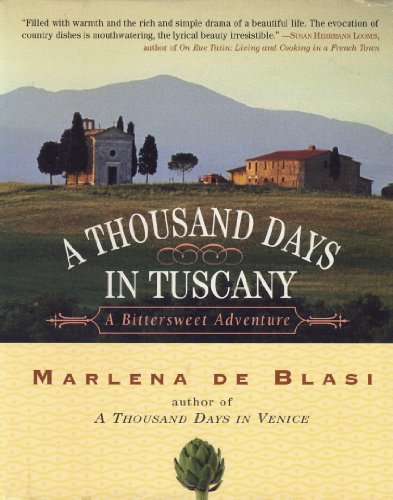

Food will take center stage: fat and velvety zucchini blossoms a haunch of boar pecorino bread ropes of pasta dressed with green tomatoes, garlic, oil, and basil all the humble, inspired dishes that make you want to bark with pleasure. That’s not the point they have come there to scrub their lives as if with a loofa, to follow the rituals of rural culture in San Casciano dei Bagni, a place of olive and cypress trees, meadows with sheep and sunflowers and lavender. We’ve hardly come to Tuscany for the house.” Which is a good thing, for this old stable is far from chic. “Three years ago, when I left America to come to live in Italy, it was neither Venice nor the house on the beach that lured me. ) includes recipes for a few of the dishes with which she charmed the stranger.Another savory slice of de Blasi’s life ( A Thousand Days in Venice, 2002, etc.), this one chronicling her move south to a small Tuscan town. She conjures up vivid images of produce "so sumptuously laid as to be awaiting Caravaggio" and picturesque scenes of the vendors, such as the egg lady who keeps her hens under her table, collects the eggs as soon as they are laid and wraps each one in newspaper, "twisting both ends so that the confection looks like a rustic prize for a child's party." In a final section entitled "Food for a Stranger," de Blasi ( Regional Foods of Northern Italy De Blasi's breathless descriptions of her improbable love affair can be cloying, but she makes up for these excesses with her enchanting accounts of Venice, especially of the markets at the Rialto. They leave Venice, he espouses her interest in food and they now direct gastronomic tours of Tuscany and Umbria. Then one day Fernando surprises her by announcing that he is quitting his job at the bank where he has worked for 26 years. She survives his criticism of her housekeeping and his displeasure at her insistence on remaining a serious cook (in modern Italy "No one bakes bread or dolci or makes pasta at home," he tells her), and they marry. Although the banker, Fernando, lives in a bunkerlike postwar condominium on the Lido rather than the Venetian palazzo of her dreams, and some of his European ideas about women clash with her American temperament, the relationship works. Louis, Mo., she agrees to return to Italy and marry him, leaving behind her grown children and her job as chef and partner in a cafe. After "the stranger" (as she coyly calls him throughout the book) pursues her back to her home in St. On a visit to Venice, de Blasi meets a local bank manager who falls in love with her at first sight.


 0 kommentar(er)
0 kommentar(er)
